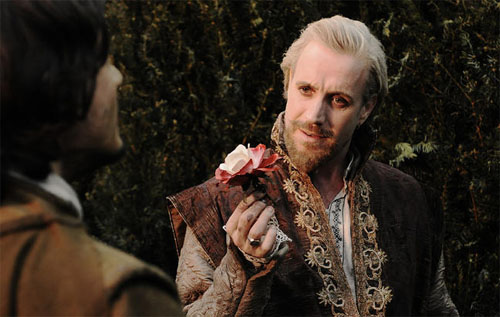Review: Anonymous

"To be or not to be?" might be regarded as one of the greatest questions ever asked. But the topic raised on whether or not William Shakespeare actually wrote the words credited to him might be a better question, according to the film Anonymous. Roland Emmerich (Independence Day, The Day After Tomorrow) takes a break from showcasing all of the ways our world could come to an end by directing a movie that offers up a theory that could very well shatter the world of many an aspiring writer and/or playwright. Anonymous is a very well acted film, and if you're a fan of Shakespeare, it does put the viewer in the shoes of those who first witnessed plays written by ... well, I suppose whomever they might have been written by.
Anonymous opens in the present day, on a Broadway show where a lone man stands onstage and ponders the question of whether Shakespeare wrote the words attributed to him. He offers evidence such as the lack of actual historical manuscripts as proof that the question is a legitimate one.
We're then transported to the time in which we know Shakespeare lives. This is a time in which a play that might offer up a sarcastic word about the royalty of the country or others who may be in charge could be considered seditious, and the playwrights would be arrested on sight. On one occasion, the Earl of Oxford (Rhys Ifans) witnesses a rather impressive play and he bails out the writer but offers a condition -- he will allow this writer to put his name on his manuscripts so someone will get to witness them. As it turns out, the plays are amazing, and jumping on an opportunity, an illiterate actor named William Shakespeare (Rafe Spall) steps in to accept credit from an adoring crowd.
Rhys Ifans does a great job in the lead role here. His Earl of Oxford is a troubled man who shuns his royal obligations in order to create the masterpieces we all know of today. Vanessa Redgrave as Queen Elizabeth shows a side of the Queen that I don't think a lot of us have seen onscreen. She's a character with emotion, and she loves the theater, much to the chagrin of her handlers.
Emmerich's direction was a fresh change of pace from what we've seen of him before. Without the backdrop of a large disaster to motivate the characters here, he's shown he can cultivate a dramatic script into something compelling and tense.
The central question in Anonymous certainly is an interesting one, and it was a surprise to me to learn that the issue of whether Shakespeare wrote the masterpieces we think he did is a legitimate conspiracy in some people's eyes. It's mostly an internet conspiracy but a conspiracy it is nonetheless. So was it a political coverup? Could a "commoner" actually write such intelligent plays? Is a nobleman really the only type of man who could have the education to have written such magnificent plays? We may never really know, but so much time has passed that this interesting question has made for an interesting film.
In addition, getting the chance to see the conditions of where Shakespeare lived at the time when someone wrote the plays that have helped cultivate many facets of our lives is an intriguing thing to see unfold.
It's equally moving to see what it might have been like for people to experience his words for the first time. I don't remember the first time I read or had someone read the words of Shakespeare to me, but sadly that time doesn't resonate in my head as it might have for characters in Anonymous. In that regard, as a work of fiction, Roland Emmerich has made a pretty good movie.

